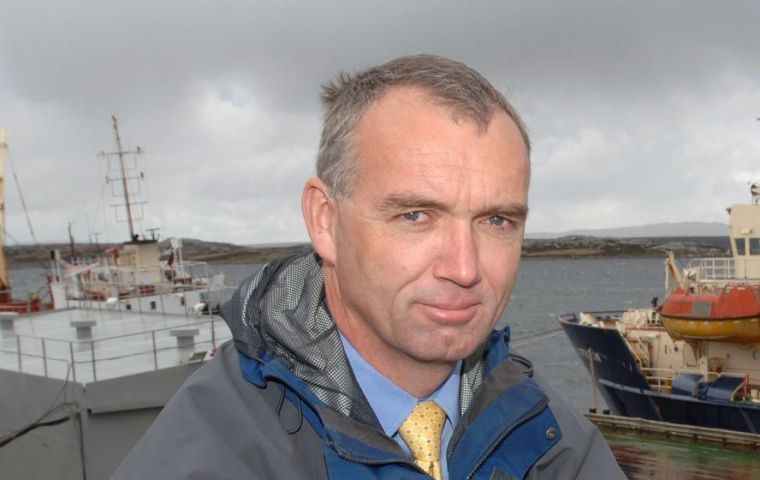MercoPress. South Atlantic News Agency
Falklands and the 'darker side' of fishing: crewmen trying to 'jump ship'
 Fisheries head Barton said all vessels arriving to collect licenses undergo an inspection, which checks essential life saving appliances
Fisheries head Barton said all vessels arriving to collect licenses undergo an inspection, which checks essential life saving appliances Fishing vessels licensed in the Falkland Islands all undergo safety inspections, Director of Natural Resources John Barton confirmed this week, when talking to Penguin News about standards applied to fishing vessels and the working conditions of the crew. He also assured that if a fisherman reports mistreatment an investigation will follow.
With a successful 2014 squid fishery drawing to a close, licensed vessels reporting record catches, and the Falkland Islands Government expecting to report an income of around £20 million this year, Penguin News asked Chief Inspector Len McGill of the Royal Falkland Islands Police and Mr Barton, about what has been described as the ‘darker side’ of the fishing industry.
Most years a number of crewmen try to ‘jump ship’; leaping into the freezing waters of Stanley Harbor or outer harbors in order to escape the vessel on which they work.
Some survive and have been returned to their ship or country of origin, depending on their preference. Others have perished as in February this year when three men were reported missing from a Taiwanese jigger. Their bodies were never located despite searches locally.
The reports of 'man overboard' since 1985
Chief Inspector McGill said since 1985 there have been 35 reports of ‘man overboard’ which in total resulted in 89 persons lost at sea. From the 35 reports, 10 bodies were recovered and 79 were recovered alive from the water. He also noted that the police have attended 122 deaths on board ships, “from murders and fires down to people having heart attacks and illnesses.”
Of those who deliberately jumped ship and survived, some simply claimed home-sick, others reported bad working conditions or mistreatment.
So are the vessels licensed by our Government subject to health and safety checks and if yes, what happens if the vessel is below standard?
Mr. Barton told Penguin News: “All vessels arriving to collect licenses undergo an inspection. This checks essential life saving appliances; sufficient life raft places, equipment in date etc.” A significant proportion of jiggers have extended inspections each year which verifies that a wider range of safety equipment is in place: “It also gives the opportunity for the inspecting Fishery Officers and also attending Customs and Immigration officers to see the crew and potentially detect any problems,” he said.
In the event of a serious defect such as insufficient life rafts, the licence will be withheld until the defect is rectified: “There has been substantial investment in some sections of the jigger fleet with many vessels being modern, larger and with extensive safety equipment. There have been reports of some fishermen suffering frostbite however, which should be entirely avoidable,” he added.
At the same time, the construction, level of equipment and operation of fishing vessels are largely a matter for the flag state; so South Korea for South Korean vessels and the Falklands for Falkland fishing vessels and so on.
The Fisheries Ordinance deals with conservation and regulation
The Fisheries Ordinance on the other hand, largely deals with conservation, regulation of fisheries, management of the ITQ system and not with the detailed operation or conditions on fishing vessels.
If a fisherman ‘jumps ship’ and claims mistreatment, is the ship’s captain subject to an investigation, asked Penguin News.
“Yes,” said Mr. Barton, if this occurs, “the Captain, and others, will be subject to investigation. In fact any case where a fisherman jumps ship there will be an investigation to ascertain the circumstances, regardless of whether mistreatment is alleged.”
The results of such investigations show that mistreatment is a relatively rare reason for jumping, he said: “In most cases the reasons are due to homesickness, dislike of the working conditions, or in some cases the opportunities in Stanley looked better.
In one case three crew jumped ship because they wished to phone their families. Once that had been done they were content to return to their vessel. This indicates the differing standards; access to communications should be readily available on Falklands and European fishing vessels but may be less readily available on some other vessels.
This year an increase in the number of crew using smart phones and tablets on jiggers was noticeable although the level of connectivity is uncertain he reported.
There has been one case where maltreatment has been proven with successful prosecution of the captain, and subsequent banning from the fishery.
All applications for licenses have to be accompanied by a statement from the Captain indicating whether they have been convicted of maltreatment of crew in the last five years. It may be questioned whether they would confess to a previous conviction, however the provision of false information would be a serious matter, said Mr Barton.
If a fisherman jumps ship and refuses to go back to his ship who pays for repatriation?
The ensuing action would depend on the circumstances said Mr Barton.
In any case involving maltreatment the fisherman would obviously not be returned to the vessel. In some other cases the fishing company might pay for repatriation. He said it would be unusual for FIG to pay: “It will depend on circumstances.
If crew left a vessel at FIPASS seeking better jobs in Stanley that would effectively be economic migration, and the first course would be to seek to persuade them to return to their vessel.”
A worldwide problem
The standards applied on some fishing vessels, working conditions, and terms of employment are a worldwide issue. Merchant shipping often tends to be ahead of the fishing world in this regard. In 2007 the United Nation’s International Labor Organization agreed the Work in Fishing Convention 2007.
This would provide a global standard for the basic protection on employment and working conditions for fishermen. The convention will come into force 12 months after there have been 10 ratifications.
As at July 2013, there had been four ratifications including Argentina and South Africa. Ensuring that employment and working conditions on some fishing vessels are acceptable is a major issue.
Mr. Barton said: “At FIG’s request, the FCO has been assisting in getting these messages across in both the flag states of the relevant vessels and also in the countries from where many of the crew are recruited through crewing agencies. This action was taken following the incident involving three crew reported missing from a jigging vessel back in February.”
Mr. Barton summed up saying: “Commercial fishing is often a hard and arduous career. Standards differ from flag state to flag state and most vessels operate to good standards. In many cases crew will return year after year. Unfortunately such standards are not uniform and in a minority of cases the nature of the job and the terms and conditions do not appear to be sufficiently clearly explained or set out.”
FIG Fisheries Observers
The Fisheries Department deploys observers to a number of vessels. These scientists typically spend around three weeks living and working on each jigging vessel to which they are deployed.
The number of vessels observed in this way is only a small proportion of the fleet, but it is a sample: “If anything untoward was observed it would be reported. It is evident for crew on these ships that a lot of hard work is involved in some challenging conditions; sea state, work with frozen cargo, long hours and more so in a season like the current one where catch rates are high. However, if folk are going to be out there, they probably prefer high catches to low ones.” (PN).-





Top Comments
Disclaimer & comment rules-

-

-

Read all commentsHighlights that you'd need to be a complete nut to make a career in the fishing industry if you're from a first world country.
May 07th, 2014 - 09:14 am 0'darker side' of the force..
May 07th, 2014 - 10:59 am 0FIG will not take serious action against the cashcows bringing revenue via fishing licences to the Islands. It would be interesting to see a breakdown by fishing season of how many observers were placed on these jiggers. From my understanding the conditions are so poor on these vessels that observers are rarely placed on these. If you read the wording of the article carefully, it may have been many years since any observer actually spent time on any of these jiggers. There will be no end soon for bodies of men washing up on Stanley shores.
May 08th, 2014 - 09:52 am 0Commenting for this story is now closed.
If you have a Facebook account, become a fan and comment on our Facebook Page!